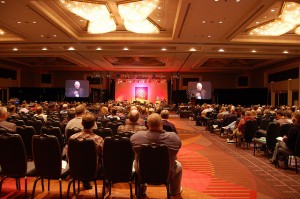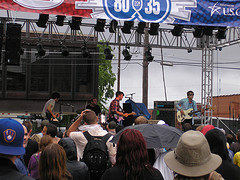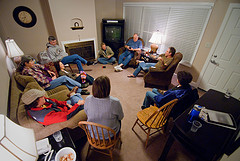There’s been a lot of reactions to the Pew Research Center’s study on the changing religious landscape of America. Having read through the 2007 one for my book on evangelical Christianity, I was excited to find out what has changed in seven years.
First of all, surprising facts:
– Evangelical Christianity has increased (it’s up by about 2 million new members)
– The number of Religious Unaffiliated (aka “nones”) has increased massively (by about 19 percentage points)
To me, these two little factoids, which are causing such a ruckus (especially fact #2), show a very different picture from that of a nation

“losing its faith.” In fact, I think this survey tells a story of increasing thought about religion across all generations.
Both younger and older generations are dropping out of mainline denominations, both Protestant and Catholic. I see two things happening: our parents (and perhaps their parents) are finally thinking about the religions they have participated in throughout their lives.
And we, the Millennial nones, have had the freedom to choose our own religion; unlike our parents, we are not expected to go to church on Sundays. So we choose not to.
America is not a “Christian nation.” It is a nation full of people who were raised Christian. Now, we’re all taking stock.
Many of us are dropping out of denominations that we perceive as old, outdated, and boring, perhaps with backwards views of society (or no comment on the current state of affairs). Mainline churches don’t ask much of us—attendance on Sunday and perhaps a donation—and we don’t want to give it.
Paradoxically, the denomination that increased—evangelicalism—requires more commitment than many other denominations. I should

know; I spent a year visiting an evangelical church for my book, and they do not just ask for a dollar on Sundays. They ask for a personal connection to Christ, an emotional investment in Sunday services, daily thought and engagement with the Bible, and participation in weekly Bible study or small group meetings. Generally, they also ask for 10% of your income (in the church I went to, this meant before taxes). This is a demanding faith. And it is the only one that grew in membership.
In other words, Millennials are not willing to sit through a sermon once a week, but they will make time to engage with churches that require a serious commitment.
We can talk about ways for churches to appeal to this (my) generation—maybe it’s the music, the setting, the message. But having been to not only an evangelical church but mainline denominations for years before that, I think that the biggest problem is that mainline churches don’t ask us to do anything.
As a young person in Catholic, Episcopalian, and Lutheran churches, I was treated as a specimen: Why did I attend? Why don’t young people go to church anymore?
I can’t speak for all Millennials, but my purpose in going to church was to center myself and be a part of something bigger. At most of the churches I went to, the “something bigger” was missing.
In fact, at most of the churches I went to, there was literally no way for me to get involved outside of sitting through a sermon. The committees that ran ministries at the church met during the day, when I worked, and were dominated by retirees. There was no young adult group and few volunteer opportunities. The opportunities that existed mainly served the church: help with a church picnic, fund a local Catholic school, be a Sunday school teacher. I am not interested in perpetuating an institution for its own sake; I want to help make the world and my community a better place. The churches I went to only did that through the lens of their own small church community, which did not include many people outside of my grandparents’ generation.
That I wanted more demands on my time from my church may seem counter-intuitive, but if I was going to commit to a church, why would I sign up for one that didn’t want me to do anything? I might as well do something more worthwhile: volunteer at a secular organization, spend time meditating on my own, read the Bible in the comfort of my pajamas.
Why would any time and cash-strapped Millennial choose to participate in traditions that do not ask anything of us? Those of us who are not committed will drop out of religion totally; those of us who want to be Christian will look for a spiritual home that is demanding and thus, more fulfilling. We don’t have time for somewhere in between.

I met lots of thoughtful people in mainline churches, and a few pastors who are very special to me. But I was never tempted to really join any of them. The way I saw it, there was nothing for me to join.
I see the shift recorded in the Pew Research survey as a good thing; Christianity doesn’t need semi-committed or unthinkingly committed participants. It needs people who care about its tenets, who are willing to join in full force in a movement that asks its followers to “leave all and follow me.”
In a sense, churches may be becoming more Christian, not less, by losing the followers who attended because they had attended all their lives. I know the Catholic Church is better off for my having dropped out; all I did was complain about its position on birth control.
So churches of all stripes, take heart. The way to reach my generation isn’t through bells and whistles; you don’t need to make it “easier” for my generation to join. You need to respect our commitment to your cause by finding ways to use that commitment to help others. Basically, put us to work. Give us a place we can participate. Let us join in.












